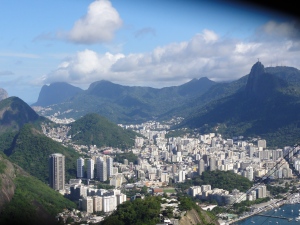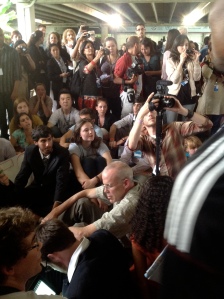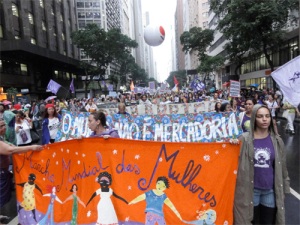A Review of Rio+20
The recent UN and People’s Climate Conferences held in Rio de Janeiro, Brazil attracted an estimated 50,000 people. Several hours’ drive and galactic differences in perceptions and goals about what is needed to avert an impending ecological, social and economic disaster separated these two distinctly divergent conferences. The Rio+20 United Nations Conference on Sustainable Development and Green Economy predictably emphasized “Development and Economy” and gave lip service to “Green and Sustainable”. The UN ended with a watered down, non-binding agreement to look at making
commitments at some future date. The UN focus was primarily on privatization and using market solutions to solve the problems that were primarily created by the market. In other words, more talk and environmental inaction! The so called solutions offered by primary participants in the UN conference all revolve around putting a price on the use of natural resources previously considered ‘free’. This will only lead to greater destruction and increasing the gap between rich and poor on this planet.
The People’s Conference, at the Flamingo Park, in downtown Rio was a 5km strip of tents and makeshift buildings where citizens from around the world gathered to discuss how to protect, defend and address the rights of nature, as a fundamental solution to the climate crisis. The basic outcome at the people’s conference was a galvanizing of civil society towards taking matters to the people.
Below is an overview and assessment of the Rio+20 conference (now being called by many Rio-20). Robin Milan, Administrator of the Global Alliance for the Rights of Nature, and I went to Rio with a particular focus around the issue of the rights of nature. Before I get into the many aspects and elements of the conferences I want to share with you two issues that inspired me and gave me hope: The youth movement and the growing awareness of the Global Alliance for the Rights of Nature.
What gives me Hope?
The Youth Movement
As in previous conferences there was a large representation of the youth at this conference. Currently 52% of our global population is under the age of 30. These are the people who are inheriting the mess that we are leaving behind for them and future generations. They are the ones who will in a very short time need to figure out how to govern 9 billion people in deteriorating environmental, economic and social systems. The young people who attend these conferences often have a better grasp on the issues than the politicians, lobbyists and corporate promoters.
At a Youth Summit prior to Rio+20 UN Secretary-General Ban Ki-moon, told the young people, “make some noise, I mean raise your voices. Demand real action [at Rio+20]”. Frustrated by the Rio document, which all felt had been bought by corporate interests, swarms of youth and civil society groups walked out of the conference center, turning in their badges in protest as they departed. Within minutes twitter, face book and social media around the world was a buzz with this demonstration of discontent.
In talking with these young people I am deeply moved by their understanding of the issues, their ability to mobilize and communicate and their commitment to do what is right for the future of the children of all species. It is clear that today’s youth will not be distracted by hollow promises and fake solutions.
The second thing that gave me hope was the tremendous recognition of the need for a global structure and mind shift that recognizes the Rights of Nature as legal and enforceable rights. This will take a total paradigm shift in our thinking and that is exactly what we need right now. There is no way we can continue with business as usual in the way we extract, defile and destroy our very life support systems. Please read the report in this newsletter from Robin Milam,
the executive administrator of the Alliance for the Rights of Nature. This represents a powerful new direction for environmental restoration and sanity. It is an idea whose time has come and it is catching on quickly.
What has been happening at the UN site?
Twenty years after the first Rio conference, when hopes were high, possibilities were rich and there was a consensus that something needed to be done to protect the ecosystems, we see that we have actually moved backwards. In fact every ecosystem has been significantly degraded and many have reached threatening tipping points. Climate change is devastating the planet with fires, increasingly violent storms, floods and record temperatures. Fewer people in the US now believe that climate change is a real threat or caused by human activity than they did 20 years ago, thanks to huge climate denial investments by the fossil fuel industry and other corporate interests.
The final UN document from Rio+20, entitled The Future We Want, was hailed by UN Secretary General, Ban Ki Moon as “a solid platform to build on which has affirmed fundamental principles, renewed essential commitments, and given us new direction.” This document says it has affirmed “voluntary commitments to shape a more sustainable future for the benefit of the planet and its people.” We have seen how these “voluntary commitments” have worked in the past. To expect corporations, whose primary purpose is to produce profits, to suddenly get a moral, social and environmental conscience is like a zebra turning in his stripes for spots.
While the suits and ties of industry and corporate colonialism hailed this document as a breakthrough and success, most of the world sees it for what it is, a new spin on a massive failure that pushes us towards greater climate destruction, expanded privatization of the commons, and a widening gap between the rich and poor!
Economic Growth in a closed loop system
The word you hear the most in looking at how we should fix the economy is growth. Growth will produce jobs, get our economy back on track, stimulate the economy and bring prosperity. That may have been good when we had a billion or less people on the planet, but at this point in our evolution it constitutes a kind of hopeful insanity. As Rita Mae Brown says, “insanity is doing the same thing over and over, expecting different results.” We are trying to fix the problem of the destruction of our planet and ecosystems with market solutions. We are even creating sophisticated ways of packaging pollution for profit. WE CANNOT HAVE AN ECONOMIC SYSTEM BASED ON PERPETUAL GROWTH WITH FINITE RESOURCES AND A GROWING POPULATION!
I am sorry to be so bold, but come on… Technology, innovation and no amount of economic analysts’ hocus pocus are going to save us. We are not above nature and natural systems, nor are we smarter. We are Nature! There are long-range consequences of our actions on all life. Traditional economists think short-term, react short-term, pursue short-term goals. New emerging eco-economists think long-term. Like the native tribes that thought in terms of seven generation, we need to look out at future life on our planet and protect the future generations of all species. Nature needs diversity to evolve, grow and continue. How do you protect future generations from something like the 52,000 tons of dangerously radioactive spent fuel stockpiled from commercial and defense nuclear reactors that have a toxic half-life of 25,000 years? Rather than market solutions we need to apply the precautionary principle (http://en.wikipedia.org/wiki/Precautionary_principle) to all corporate, commercial and industrial processes.
Energy
Nearly a billion and a half people on the planet have no electricity at all, while 40% of the population relies on solid fuels for heating and cooking. As billions of people struggle to meet their energy needs, over consumption of energy primarily in the North is driving dangerous climate change – 11% of the population produce over half of all greenhouse gasses. The International Energy Agency warns that failure to reduce fossil fuel consumption will put the world on the path to at least a 6c (fatal) temperature rise.
The current UN initiative as it stands, “is inadequate and non-inclusive and will not achieve the level of change required to tackle both energy poverty and dangerous climate change. To date, multinational corporations have been given the biggest role, while the very voices of those it exists to help have been excluded at the highest levels,” reports a statement signed by 107 global civil organizations and NGOs. We are all in this together and we must stand up to the corporate commitment to control and commodify all of nature.
Yes, there is room for economic entrepreneurship, but it needs to be more localized, and when it comes to energy less centralized. Nature does not waste! It uses everything. It’s time to learn to live within our ecological limits and begin to think like nature. Starting with conservation and how we personally live our lives. Corporate interests can’t survive if we stop supporting them. The fossil fuel industry has a revolving door with our government and our banks. We can no longer afford the luxury of sitting by and being spectators. We must become mindful of our part in the larger system and how our every day being in the world impacts that system.
Fossil Fuels and Subsidies
“By claiming progress when none has been made towards getting rid of fossil fuel subsidies, world leaders are cooking the books and cooking the planet. They are ignoring the global outcry to stop funding climate change by getting rid of fossil fuel subsidies, instead choosing to do nothing and point to existing commitments which amount to nothing. Leaders need to listen to the people and fund the future, not fossils.”
Stephen Kretzmann, Executive Director of Oil Change International
The final declarat
ion of the Rio+20 summit takes no concrete action to eliminate the trillion dollars a year in fossil fuel subsidies. Voluntary commitments have led to zero subsidies being eliminated since the G20 adopted them over three years ago. Global public support and outrage has been demonstrated by over 1 million signing a petition call for action now. Elimination of these subsidies would reveal real costs of products and level the playing field for the emergence for real green technologies. If we actually included the externalized costs of infrastructure, health and destruction of natural capital we would speed up conservation, innovation and creativity. The IEA reports, that “phasing out global fossil fuel subsidies could provide half the global carbon target by 2020.”
In spite of the fact that we have reached peak oil and every future barrel of oil extracted will be more expensive and have a greater environmental impact, we continue to support and subsidize fossil fuel extraction and move towards even dirtier forms of refinement like tar sands and coal gasification. The recent hydraulic fracturing (fracking) craze that is sweeping the US is polluting ground water to the point in some cases where the water catches on fire. The polluted water then has to be contained somewhere to avoid further poisoning of the ground water. This latest frontier for natural gas will leave many towns and landscapes devastated when the gas runs out, like those of the gold rush era. If we only use half of the known oil reserves we have in the ground it is predicted that it would lead to a devastating rise in climate temperature of 4 degrees centigrade, making earth uninhabitable.
Natural resource extraction has never been a pretty business when it comes to the environment, but the era of easy oil, easy gas, easy minerals and other resources is basically over, and what’s left is in deep water, remote or inhospitable climates, or in geological formations that require extraordinary means to get at. This means that the social and environmental consequences will continue to escalate and further deteriorate our eco systems. We continue to do this in the name of jobs and the economy. But, as I have said before, there is no economy on a dead planet! What can we do today to lessen our ecological footprint and use our dollar power to remove our support from corporate destruction? Living inside of this question will go a long way towards a shift in our global mind-set.
Agriculture and Food Security
It may well be that the one area that will bring the greatest devastation to our economic and social systems as well as threaten peace and future life on our planet, is the collapse of industrial agriculture. This is not a question of, will the industrial food system fail, but when will it unravel. You cannot continue a system that is based on the use of petroleum fertilizers, antibiotics, genetic seed manipulation and production of mono-crops. Industrial Farming practices continue to destroy the fragile topsoil at a rate of an eighth of an inch, or 1% of our top soil per year.
On average, the planet is covered with little more than 3 feet of topsoil, the shallow skin of nutrient-rich matter that sustains most of our food and appears to play a critical role in supporting life on Earth. Topsoil thrives on biodiversity. It is estimated to take about a hundred years to naturally produce an inch of topsoil. Yet, we continue to tear down fragile forests, the lungs of our planet, killing all life, planting genetically modified seeds with terminator genes to planting mono cultures. We then ship the food an average of 1500 miles to the super markets. This is not sustainable. Yet, this is precisely the kind of market solutions that are being discussed and supported at Rio+20. What is needed are more local farms and farmers, using organic soil restoration methods and planting diverse crops which are sold locally.
We also need to stop Biopiracy, creating patents of legal rights over biological materials by international companies to develop food or medicines, without recompensing the countries and communities from which they are taken. Monsanto and Rice Tec are two of the leader in this area. Seeds and plants are not the property of corporations. They were given to all from Mother Earth and need to remain part of the commons for the good of all. In addition to these issues there is a massive land grab going on around the planet with rich countries buying up agricultural land in other countries with the intention of growing and exporting food. This is reminiscent of the Irish potato famine when people were starving while food was being exported to England.
As Vandana Shiva says about the Rio+20 conference, “The biotechnology industry which has caused genetic pollution by releasing genetically engineered organisms into the environment is making the rules on how to manage biodiversity and how to govern Biosafety.” We need to take back the commons and our role as care takers of nature by recognizing we are nature. Water, seeds, minerals, the earth is not a product. It is a life support system.
Empowerment of Women
The final outcome document for the Rio+20 summit is 53 pages long, some 23,917 words. Women were mentioned in less than 0.01 percent of the text. Of the seven priority areas of discussion at the summit, none included a focus on women’s health and empowerment.
Women’s empowerment leads to poverty reduction, more democratic governance, crisis prevention and recovery, environmental care and sustainable agriculture. The proportion of working-age women who are employed lags behind men in all regions. Yet women are indispensable in agriculture, producing up to 80 percent of the world’s food, and their unpaid labor is estimated to contribute up to 50 percent of GDP in some countries.
By preventing unintended pregnancies, family planning can enhance women’s employment opportunities, and increase their financial contribution to communities and nations. With 7 billion people on our planet and a projected 9-12 billion by 2050, you would think that population control would be at the top of the agenda. But, once again the Vatican has used its privileged position at the United Nations to impose its extremist religious agenda on the negotiation process. Despite the best efforts of women leaders in government and civil society, strong statements on access to contraception and reproductive health services are still in doubt. All mention of population control, abortion, and family planning were stricken from the UN document. The Catholic Church and right wing anti- abortion interests were the primary groups that kept women’s reproductive rights out of the final document.
Consequences of environmental change, floods, droughts, crop failures affect everyone, but are especially hard on women and families. As the primary people responsible for gathering water, firewood, and other household resources, women are on the front lines of the climate crisis. When they are able plan the timing of their own childbearing, they can better adapt to the unpredictable impacts of climate change, and ensure the survival of their families. When they have an equal voice in governance more caring and sustainable laws and agreements emerge. Women tend to look with a more whole systems perspective than men, which leads to cooperation rather than competition,
Water
No resource is more critical to life on earth than water. Water rights have been an issue through all time. Without it we cannot survive. Yet corporate efforts to privatize water around the world will probably result in water exceeding oil as the most valuable resource in the future. Securing the rights to water for the commons is essential for our future and the future of all life on this planet. Over one billion people do not have access to safe drinking water and more than one million children die each year of diseases caused by unsafe water and lack of sanitation. As water scarcity grows, so too will these numbers.
At Rio+20 water was one of the seven key issues under discussion. Companies ranging from Coca Cola, Nestle, Glaxo SmithKline, Merck and Bayer signed a special communiqué highlighting the urgency of the global water crisis. The fact that these companies have all been involved in the privatization, pollution, waste and commodification of water might raise some concern about their profit motive. Their primary goal was to establish a “fair and appropriate price for water.” The UN estimates that two thirds of humanity will live in water-stressed regions by 2025 as a result of population growth, urbanization and industrialization trends and climate change.
Water is a public trust; it belongs to everyone. But water privatization is sneaking through the back door in the form of public-private partnerships. We must become involved in water issues on a local and global level by being informed and acting.
Carbon dioxide emissions are not just warming up our atmosphere, but are also changing the chemistry of our oceans. This phenomenon, known as ocean acidification, is one of the most serious, yet under – recognized challenges facing life on earth. Ocean acidification, a process in which seawater chemistry changes when the ocean absorbs rising levels of atmospheric carbon dioxide, is profoundly affecting global waters and marine life.
Seventy percent of our beautiful blue planet is covered in ocean. While there was more heated and protracted discussion at the UN conference than ever before concerning the protection of health and future of life in the oceans, little progress was made towards any real commitment. Members of the High Seas Alliance (HSA) attending the Conference said the final outcome “should be a catalyst for action”. Again this conference came short of any binding agreements or protection for our oceans.
The agreements that have been discussed for decades are basically being ignored, averted or stalled. Fulfillment of the commitment to eliminate deep-sea bottom fishing; end overfishing until stocks have recovered; create requirements that regional fisheries management bodies be accountable to the UN; eliminate harmful fisheries subsidies; Close ports to illegally obtained fish; Establish national and high seas marine protected areas, including reserves – none of these are being enforced. A very disappointing outcome defers a decision for two and a half years. In spite of excellent leadership and support by Brazil, the European Union the Pacific Small Island States, who are facing a 2-10 meter sea rise, and others, this weak decision was all that was possible, due to opposition from the US, Canada and a handful of other countries.
A study produced by Media Matters for America, a progressive research and information center concluded that 77% of Americans say they have read or heard nothing about ocean acidification. Of the 23% who say that they have heard of ocean acidification, only 32 percent understand that ocean acidification is caused by carbon dioxide. In other words, less than 8 percent of Americans understand the basics of one of the largest threats to our oceans — and a major culprit for that ignorance is the national media. This is good reason to follow and support independent media like KVMR.
Transportation
The eight largest multilateral development banks (MDBs) announced that they will invest $175 billion to finance more sustainable transportation systems over the coming decade, boosting equitable economic development and protecting the environment and public health across the developing world. The pledge by the Asian Development Bank, the World Bank and six other MDBs was made at the start of Rio+20. This is a good start and hopefully will help to reduce carbon emissions in urban areas around the world.
Congestion, air pollution, road accidents and transport related climate change can cost 5-10% of GDP per year, but this number does not represent the impact on health and the environment. The transportation sector is now the fastest
growing source of greenhouse gases as a result of decades of urban planning that focused on improving mobility for automobiles at the expense of public transport users, cyclists and pedestrians. This approach has made life much more difficult for people in cities, especially the urban poor.
What is needed here is a systems perspective and mind shift around issues work, localization, place and social mobility. The days of using fossil fuel to transport people is coming to an end.
There are many more issues that were addressed at Rio+20. But, in every case the outcome was the same. No real commitment to match the challenges we face!
A message from a 17 year-old youth representative
My name is Brittany Trilford. I am seventeen years old, a child. Today, in this moment, I am all children, your children, the world’s three billion children. Think of me for these short minutes as half the world.
I stand here with fire in my heart. I’m confused and angry at the state of the world and I want us to work together now to change this. We are here to solve the problems that we have caused as a collective, to ensure that we have a future.
You and your governments have promised to reduce poverty and sustain our environment. You have already promised to combat climate change, ensure clean water and food security. Multi-national corporations have already pledged to respect the environment, green their production, compensate for their pollution. These promises have been made and yet, still, our future is in danger.
 We are all aware that time is ticking and is quickly running out. You have 72 hours to decide the fate of your children, my children, my children’s children.
We are all aware that time is ticking and is quickly running out. You have 72 hours to decide the fate of your children, my children, my children’s children.
Let us think back to twenty years ago – well before I was even an inkling in my parents’ eyes – back to here, to Rio, where people met at the first Earth Summit in 1992. People at this Summit knew there needed to be change. All of our systems were failing and collapsing around us. These people came together to acknowledge these challenges to work for something better, commit to something better.
They made great promises, promises that, when I read them, still leave me feeling hopeful. These promises are left – not broken, but empty. How can that be? When all around us is the knowledge that offers us solutions. Nature as a design tool offers insight into systems that are whole, complete, that give life, create value, allow progress, transformation, change.
We, the next generation, demand change. We demand action so that we have a future and have it guaranteed. We trust that you will, in the next 72 hours, put our interests ahead of all other interests and boldly do the right thing. Please, lead. I want leaders who lead.
I am here to fight for my future. That is why I’m here. I would like to end by asking you to consider why you’re here and what you can do. Are you here to save face? Or are you here to save us?














